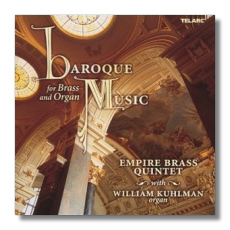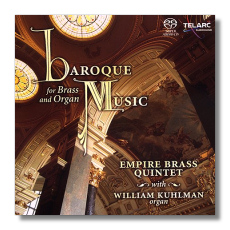
The Internet's Premier Classical Music Source
Related Links
- Latest Reviews
- More Reviews
-
By Composer
-
Collections
DVD & Blu-ray
Books
Concert Reviews
Articles/Interviews
Software
Audio
Search Amazon
Recommended Links
Site News
 CD Review
CD Review
Baroque Music For Brass & Organ

- Henry Purcell:
- Rondeau from Abdelazer
- Overture and Allegro from King Arthur
- March from The Married Beau
- Johann Sebastian Bach:
- Fantaisie in C Major, BWV 570
- Contrapunctus I from The Art of Fugue
- Opening Movement from A Mighty Fortress Is Our God, BWV 80
- Georg Philipp Telemann: Concerto in E Major
- George Frideric Handel:
- Sonata da Camera
- Allegro from Oboe Concerto #1 in B Flat Major, HWV 301
- André Campra: Rigaudon from Idomenee
- Johann Pachelbel: Fantasia in D minor
- Tomaso Albinoni: Fantaisie (Allegro)
- Jeremiah Clarke:
- Trumpet Voluntary
- The Prince of Denmark's March
- Marc-Antoine Charpentier: Prélude from Te Deum in D Major
Empire Brass Quintet
William Kuhlman, organ
Telarc CD-80614 DDD 54:33
Also released on Hybrid Multichannel SACD SACD-60614: Amazon - UK - Germany - Canada - France - Japan - ArkivMusic - CD Universe
The combination of brilliant brass sonorities with the organ's thundering majesty is one of Baroque music's most popular clichés. How curious it is, then, that there seems to be relatively little original repertoire written for this combination of instruments! Almost every one of the fifteen selections on this CD is an arrangement by Rolf Smedvig, the trumpet soloist and conductor of the Empire Brass Quintet. Smedvig's arrangements highlight the ensemble's excellent musicianship, and they are stylistically apt. There's nothing wrong with these "faked antiquities," for lack of a better phrase. If you didn't know better, you'd probably never guess that you were hearing arrangements. There's something touching, in this age of authenticity, about our desire for artifice of this sort. Perhaps fakes can seem more real than the real thing!
Many favorite works are included. The program opens with the Rondeau from Purcell's Abdelazer, a tune familiar to many because Britten used it in his Young Person's Guide to the Orchestra. There's also Clarke's famous Trumpet Voluntary (been to any weddings or graduations lately?) and the Prélude from Charpentier's Te Deum, which has been appropriated by Eurovision. Pachelbel and Albinoni are represented, but not by the Canon or the Adagio, respectively – both standards of your average "Baroque Greatest Hits" collection. In other words, while the instrumentation and the program concept were apparently designed to appeal to popular tastes, the program itself contains enough that is unhackneyed to satisfy more selective collectors.
The Empire Brass have been around for decades, but the members have changed over the years. (Smedvig is the founding member.) A horn player by the name of Michelle Perry has joined them, and I gather that this is her first recording with the Quintet. The reputation of the Empire Brass is in no peril; solid intonation and laser-accurate articulation remain as givens, along with a brilliance that never turns shrill or piercing. William Kuhlman teaches organ at Luther College in Decorah, Iowa, where this CD was recorded. His assured playing complements that of the Quintet; I wish only that he had been given more solo opportunities. The recording does favor the brass somewhat, but I am guessing that this is an accurate reflection of the venue. A more prominent organ would have sounded artificial.
In short, this is a CD that will make you feel regal, if not saintly, although it probably won't appeal to the strict academics in the audience.
Copyright © 2003, Raymond Tuttle





















